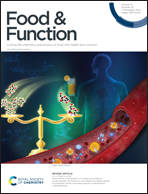Nicotinamide riboside ameliorates high-fructose-induced lipid metabolism disorder in mice via improving FGF21 resistance in the liver and white adipose tissue
Abstract
Fructose has been reported to acutely elevate the circulating fibroblast growth factor 21 (FGF21) levels, which ultimately causes FGF21 resistance. FGF21 resistance is suggested to result in lipid metabolism disorder. Nicotinamide riboside (NR) can alleviate lipid metabolism disorder in mice. It is unknown whether NR supplementation would alleviate lipid metabolism disorder in high-fructose exposed mice via improving FGF21 resistance. In this study, C57BL/6J mice were given 20% fructose solution for free drinking with the supplementation of NR in 400 mg kg−1 day−1. The results showed that NR supplementation decreased the serum and hepatic lipid profile levels. The increase of lipid droplets in the liver and the size of adipose cells in WAT induced by a high-fructose diet were alleviated by the addition of NR. NR supplementation increased the NAD+/NADH ratio and activated the SIRT1/NF-κB pathway. The down-regulation of NF-κB is accompanied by a decrease in inflammation, which may increase the expression of the FGF21 receptor complex, namely KLB and FGFR, then restore its downstream signaling cascade, including ERK phosphorylation and EGR1 and c-FOS expression, and ultimately improve FGF21 resistance. With the FGF21 function recovery, hepatic PGC-1α expression was up-regulated, and hepatic SREBP-1c expression was down-regulated, resulting in decreased lipogenesis. Furthermore, restoration of the FGF21 signaling pathway also led to increased expression of ATGL and HSL in WAT, which promotes lipolysis. In conclusion, we found that NR supplementation could ameliorate high-fructose-induced lipid metabolism disorder by improving FGF21 resistance in the liver and WAT, which may be related to the regulation of inflammation mediated by the SIRT1/NF-κB signaling pathway.



 Please wait while we load your content...
Please wait while we load your content...